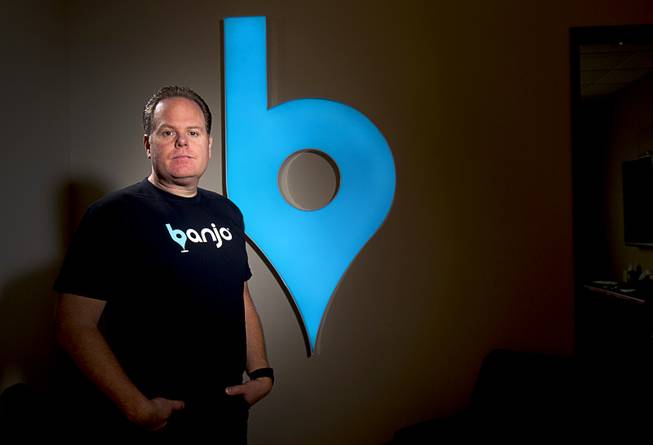Monday, Nov. 2, 2015 | 2 a.m.
In the next 60 seconds, the 3 billion people connected to the Internet will post on Facebook 2.5 million times, tweet 300,000 times and log 72 hours of video on YouTube.
Most of it will be quotidian: A kitten. A rant. A selfie. The best brunch ever.
Damien Patton file
For someone who has been on the move for much of his life, Damien Patton is relatively settled in Las Vegas. He has been here since 2002. The city fulfills his daredevil appetites – dirt biking, off-road racing, cycling. But Patton doesn’t see Las Vegas as a tech city. “It’s not the next Silicon Valley,” he said. “And it has got decades to go before it may even become known as a substantial tech hub.” That’s why Banjo still houses its tech team in the Bay Area, he said. But Patton also recognizes potential in Las Vegas, which he says has numerous business advantages. Patton suggested that more firms – tech or otherwise – open hubs in the valley. “You have to use Vegas for what it’s good for,” Patton said. “To me, it’s the greatest city in the world for playing catch,” meaning developing partnerships. Why? Because tons of people come here for professional and personal reasons. “It has been phenomenal for us.” Patton said.
A short history: Patton ran away from home at age 15, in the ’80s, and spent the rest of his early years homeless on the streets of Los Angeles.
Patton served in Iraq in Operation Desert Storm.
He also worked as head mechanic for a NASCAR pit crew at the Charlotte Motor Speedway.
Patton graduated magna cum laude from the University of North Carolina in Greensboro and took classes at Massachusetts Institute of Technology.
He spends Mondays, Tuesdays and Wednesdays in Silicon Valley.
How do Banjo’s computers know what they are seeing?
Enter neural networks.
Modeled on human biology, neural networks learn as they complete tasks — in this case, interpret images. So Banjo staffers feed them billions of images, and they can use the information to interpret data in the future. In other words, Banjo programmers teach the neural networks how to identify, say, a Bud Light bottle, so they can find them in pictures posted down the road. The neural networks become more powerful and precise the more images they see, and they continue to learn with exposure. That’s key to Banjo’s strategy and what its backers believe could give it an edge. Patton can identify not only the context of a post but also information about where the post was generated. Banjo can train its neural networks to learn what a specific location looks like because most places have been photographed. Patton said there have been 1 trillion photos of locations shared all over the world. “Believe it or not, between videos and photos, most of the planet where there is any population has been mapped out through some form of social network,” Patton said.
What if I don’t want Banjo to see what I’m doing?
The easiest way to keep Banjo out of your feeds is to mark your content private. Company officials say they comb only publicly shared data. However, privacy can get complicated if someone takes a photo of you and posts it onto a public social media page without your knowledge. In that case, your image would appear on a Banjo feed, whether you like it or not.
Possible applications
Banjo technology could be applied to myriad uses in the future:
• Searching for copyright infringements
• Helping with emergency response
• Using historical data to predict trends
• Aiding with vacation planning
• Traffic applications
Banjo app
Banjo offers an app that anyone can use. It uses social media, sorted by location, to keep people informed about breaking news, sports, music and events.
But not for Las Vegas resident Damien Patton. From such posts, Patton, a homeless youth-turned-Desert Storm veteran-turned-NASCAR mechanic-turned-techno-visionary, has made a crystal ball that, thanks to his lightning-fast ability to parse social media information, can see in real time fires and terrorist attacks, oil spills that could affect global trade and even the next big thing in light beer.
For some, the data and information you post online has hidden value. From Patton’s point of view, your posts, even the most banal, offer news outlets, financial institutions and multinational corporations a way to surveil the globe in ways imagined , until recently, only in science fiction.
“Having a power source that can tell you what’s happening anywhere in the world at any time changes the way we do everything in our daily lives,” Patton said.
Patton is CEO of Banjo, which he founded in 2011. The company sends tips to the media, parses markets for financial institutions and monitors brands for multinational companies. Like many tech companies, underneath an innocuous name is an operation with massive scope.
Banjo’s Las Vegas office, in the InNEVation Center, bears a striking similarity to a teenager’s bedroom made corporate. On a desk sits a miniature Imperial Death Star. Patton’s own corner office includes a nameplate made of Legos, flanked by Lego people.
Patton, who prides himself on his laser-like focus, has a “NO” button on his desk. He clicks it often.
An always-lit screen — the office operates 24 hours a day, 365 days a year — displays a rotating model of the Earth with thin streaks of light jetting from it. At this moment, each of the lights — and there are many — marks a location where a social media user posted a picture of the Bud Light logo.
So sophisticated is Banjo’s logo detection software that it can locate a picture of a person holding a can of Bud Light at a UNLV tailgate party. With equal ease, it can find someone standing near an 18-pack in the refrigerator at a supermarket.
Banjo shares its findings with Anheuser-Busch, which might use the information for marketing and consumer research. Company officials might turn a photo into an advertisement or comb the data for consumer trends.
Certainly, there are many tech companies that, in the most general sense, do what Banjo does: social media aggregation. But Banjo is different. The company doesn’t just monitor text but scoops up photos, videos, metadata, traffic data, weather data and financial data.
Banjo carves the Earth’s 197 million square miles into 35 billion polygons. From there, it sifts through public data — information posted on Facebook, Instagram, Weibo and more — to identify what is happening where. Its systems chew on global traffic, weather and financial data, and using algorithms and machine-learning, Banjo’s system, which Patton designed and oversees, determines the “pulse of the planet.”
In a recent demonstration for Al-Jazeera, Patton said he pulled all the posts of people drinking coffee in Starbucks while posting about how much they disliked their jobs. The results were in the hundreds.
And the data is lucrative. Banjo collaborates with thousands of companies, including NBC, Fox, CNN and NASCAR.
But it also raises concerns, particularly about privacy.
Patton recognizes both the potential and the potential pitfalls of his product.
“I don’t know that there is going to be anything more powerful in the world, and with that kind of power has to come great responsibility,” Patton said.
• • •
As technology advances, what people do with public data is shifting.
“In years past, people thought they had some privacy through obscurity,” said Dave Maass, an investigative researcher at the Electronic Frontier Foundation. “That is changing.”
So could what Banjo and other companies are doing turn people away from sharing?
Some industry experts think so. And if that’s the case, Banjo faces a frightening, potentially upending, proposition.
Maass said he worries about what the technology will do to “further chill (people’s) willingness to speak and post things online, particularly if they feel that might be used by law enforcement or freaky marketing companies.”
Patton doesn’t think so.
“Users are in control of their content, they are smart and understand how they share and why,” he said.
In fact, Patton said, “there has been an increase in content being shared, not a decrease. As content becomes more organized and useful for people, it appears that it will promote increased sharing.”
In some ways, Patton is both an entrepreneur capitalizing on the glut of public information available and a wary user. He shares some critics’ concerns about government surveillance, for instance.
Patton says Banjo has a strict policy of monitoring only public data; he says his employees even avoid content marked public but later made private.
Perhaps most importantly, Patton emphasizes that Banjo’s data is organized by location, context and time, not a user’s online identity.
“Quite honestly, we don’t care too much about who you are,” Patton said. “We care about what’s going on in the area.”
Patton also steers clear of reporting events to law enforcement officials and emergency responders.
In March, Banjo was pilloried for failing to alert authorities about an explosion in New York City. Patton’s staff knew about the explosion before anyone called 911. Rather than alert police, Banjo delivered the information to news outlets.
That’s standard operating procedure, he said.
“I’ve had to be very dogmatic about it,” said Patton, who served in the Navy during Operation Desert Storm and worked as a crime-scene investigator in North Carolina. “I (care) about user privacy.”
“New technology comes with a lot of decisions,” he added.
• • •
Patton is blunt — and often brash. He curses, says what he thinks and doesn’t mind being provocative.
“Ah f--k, I don’t know,” he said when asked when his crystal ball would be complete.
That being said, Patton also is an introvert. He is considerate of others and is fiercely self-aware. He doesn’t speak without considering how he will come off.
Banjo’s first outside investor, John Malloy, described Patton at South by Southwest’s Las Vegas conference in July: “I think you are actually very sensitive in truth, but you speak like you’re a hard-ass all the time.”
Like many tech executives, Patton wears a uniform — a Banjo T-shirt, jeans and Banjo socks tucked into black Converse All-Stars. Sometimes, he wears a Banjo hat.
Banjo isn’t a behemoth yet like Apple or Google, but it is growing fast. The company’s Las Vegas office, where staffers detect events and package curated feeds for clients, employs about 30. Its Redwood City headquarters employs 40 to 60 people. Both offices are hiring. Patton hopes to expand his staff to 200 by next year.
The expansion comes at a cost, but it’s of little concern to Patton. His company recently was bolstered by a $100 million investment from Japanese telecommunications company Softbank. Patton notes Softbank’s original offer was $300 million.
Since 2011, Banjo has raised $121 million, including an investment from the VegasTechFund, the venture arm of Zappos CEO Tony Hsieh’s $350 million investment in downtown Las Vegas.
So what’s next? Right now, the company is on a path with no definite endpoint.
While Patton has hired former media moguls and financial industry execs, he isn’t interested in creating a news outlet or trading firm, or retiring to a remote island. Patton is focused singularly on building a crystal ball he can share with — or rather, sell to — others.
The crystal ball is expanding exponentially, gaining in precision and accuracy as more sources are added and its neural networks learn to identify new images.
Patton can’t say what form Banjo ultimately will take. But there is one thing of which he is certain.
“When electricity was invented, it was considered a scientific novelty because no one knew how to use it,” Patton said. “I believe Banjo is as profound literally as creating electricity.”



Join the Discussion:
Check this out for a full explanation of our conversion to the LiveFyre commenting system and instructions on how to sign up for an account.
Full comments policy